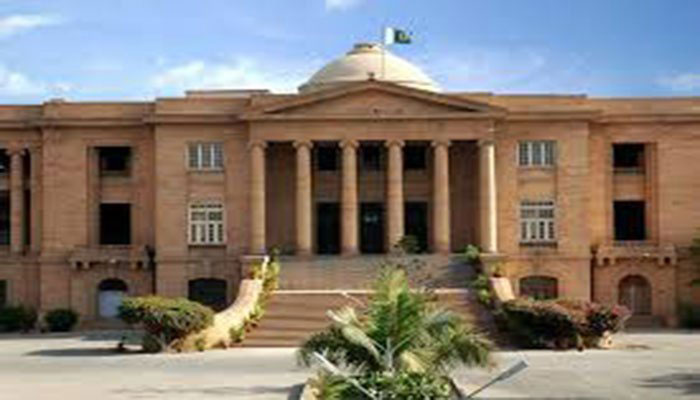SHC observes water board prima facie did not implement SC’s orders to remove illegal hydrants
The water tanker mafia sprung up in Karachi as the Karachi Water and Sewerage Board (KWSB) failed to meet the water needs of the city.
This observation was made by the Sindh High Court on Wednesday as it heard a petition with regard to the award of contracts in respect of six official hydrants in the city by the KWSB. A division bench of the SHC comprising Justice Mohammad Shafi Siddiqui and Justice Adnan-ul-Karim Memon observed that the basic duty of the KWSB was to supply water to the
citizens of Karachi.
The petitioner, Sardar Abdul Hameed, had sought an injunction with regard to six official hydrants as he requested the high court to ensure that the contractors would take into account all the rules required to be followed in respect of supplying water either to the general public or on a commercial basis.
The SHC was informed that the petitioner was not a successful bidder and the tenders in respect of all those hydrants had been awarded to individual contractors who had their independent tankers to cater to the requirement in terms of the rules.
A counsel for the KWSB submitted that water to the general public was being supplied through an app on the basis of which requirement was being calculated, whereas the official supply was also being made through these contractors. He submitted that the petitioner was neither a successful bidder nor a contractor to fill his own tankers to supply water according to his desire and demands.
The KWSB’s counsel, however, submitted that all the rules required in this regard were being implemented in the letter and spirit and in case the KWSB found out that any of its contractors was violating any rule, including the requirement of the tanker in terms of capacity, those rules would be enforced.
The high court observed that there have been certain directions of the Supreme Court for closing of illegal hydrants in Karachi but prima facie the KWSB had failed to remove illegal hydrants operating in the city.
The SHC observed that the apex court had already directed that KWSB to focus on their core operations to provide portable water through a regular distribution network and even if hydrants were needed, there should be a rational and scientific study to evaluate the need for hydrant services in water-scarce areas.
The bench observed that hydrant services preferably should supply water to improvised populations and the judiciary had already settled the issue in this regard. The SHC disposed of the petition with a direction to the water board to ensure that its rules, which the individual contractors of different hydrants were supposed to adhere to, were followed.
-
 Prince Harry Reacts As Beatrice, Eugenie's Names Surface In Epstein Emails
Prince Harry Reacts As Beatrice, Eugenie's Names Surface In Epstein Emails -
 Cyprus Joins European AI Race: What It Means For Greek LLMs And Regional Innovation
Cyprus Joins European AI Race: What It Means For Greek LLMs And Regional Innovation -
 Amazon Soon To Launch 'AI Content' Marketplace, Says Report
Amazon Soon To Launch 'AI Content' Marketplace, Says Report -
 Is AI Reliable For Health Advice? New Study Raises Red Flags
Is AI Reliable For Health Advice? New Study Raises Red Flags -
 WhatsApp Web Starts Rolling Out Voice And Video Calling For Beta Users
WhatsApp Web Starts Rolling Out Voice And Video Calling For Beta Users -
 Catherine O’Hara’s Cause Of Death Finally Revealed
Catherine O’Hara’s Cause Of Death Finally Revealed -
 Swimmers Gather At Argentina’s Mar Chiquita For World Record Attempt
Swimmers Gather At Argentina’s Mar Chiquita For World Record Attempt -
 Brooklyn Beckham, Nicola New Move Could Leave David, Victoria Reeling
Brooklyn Beckham, Nicola New Move Could Leave David, Victoria Reeling -
 Anthropic Criticises ChatGPT Ads As OpenAI Begins Testing Advertising In AI Chats
Anthropic Criticises ChatGPT Ads As OpenAI Begins Testing Advertising In AI Chats -
 YouTube Star MrBeast Acquires Step: Redefining Finance For Gen Zs
YouTube Star MrBeast Acquires Step: Redefining Finance For Gen Zs -
 Sarah Ferguson Plans Big Move To Cause ‘serious Damage’ To Andrew
Sarah Ferguson Plans Big Move To Cause ‘serious Damage’ To Andrew -
 Trump Nears 500 Press Interactions In His Second Term, Surpassing Former President Biden
Trump Nears 500 Press Interactions In His Second Term, Surpassing Former President Biden -
 Hailee Steinfeld Reveals Her Plans To Return To Music
Hailee Steinfeld Reveals Her Plans To Return To Music -
 Elon Musk Unveils SpaceX Plan For Civilian Moon, Mars Trips
Elon Musk Unveils SpaceX Plan For Civilian Moon, Mars Trips -
 MTG Commander Banned Update: Wizards Frees Infamous Instant-win Card
MTG Commander Banned Update: Wizards Frees Infamous Instant-win Card -
 Royal Family Braces For ‘final Blow’ As Andrew Scandal Deepens
Royal Family Braces For ‘final Blow’ As Andrew Scandal Deepens




